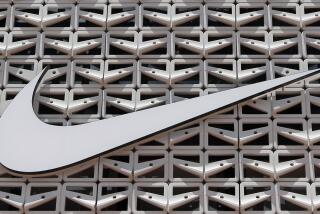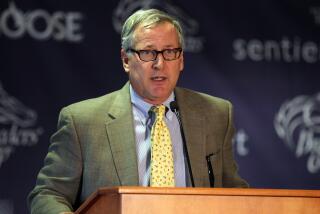Callaway Golf Names CEO and President
- Share via
Callaway Golf Co., which has drawn at least one unsolicited takeover offer in recent months, said Monday that George Fellows, an executive with experience in consumer-products businesses, had been named president and chief executive.
Fellows, who also was elected to Callaway’s board, replaces William C. Baker, who had served as interim CEO and chairman. The company also said that Ronald S. Beard, an independent director, had replaced Baker as chairman. Baker will remain on the Carlsbad, Calif., golf equipment manufacturer’s board.
Fellows spent the last five years as a business consultant for Investcorp, an international investment company, and JPMorgan Partners. He previously served as Revlon Inc.’s president and CEO during a brief but tumultuous period in the late 1990s when the cosmetics company struggled to turn a profit amid speculation that owner Ron Perelman was going to sell it.
Fellows earlier worked for Colgate-Palmolive Co., Mennen Co. and International Playtex. In a news release issued Monday by Callaway, the 62-year-old executive said he was “very excited about the company and its prospects.”
Analysts said Callaway’s financial prospects would be shaped by how quickly the company integrated its various product lines and broadened its reach to include more golf apparel and accessories.
“They’re still trying to pull things together more efficiently with Top-Flite, Odyssey, Ben Hogan and Callaway,” said Alexander Paris Sr., an analyst with Barrington Research. “That’s important if Callaway is going to be a winner or survivor in the golf business, which is still consolidating.”
Callaway, Fortune Brands and other golf equipment and apparel manufacturers have struggled in recent years to grow revenue in the face of a lackluster economy, a decrease in the number of golf rounds being played and stiff competition. Callaway, for example, lost $10 million in 2004 on sales of $934 million.
Club and ball manufacturers had hit a sales sweet spot by creating increasingly high-tech products that help even weekend duffers squeeze more distance from clubs and balls. But worried that technology has overshadowed the game’s human element, golf’s caretakers are slapping restrictions on technological innovation.
Analysts said marketing could grow in importance as rivals fought to distinguish their products, particularly as retailers winnowed the number of suppliers for golf equipment, apparel and accessories.
“Maybe having someone with all that consumer and packaged goods experience will be a good thing for the company right now,” said Tim Conder, an analyst with A.G. Edwards & Sons Inc.
Callaway shares fell 6 cents Monday to $14.93. The company’s stock hit a high of $15.59 early in July amid speculation that it might be the target of a takeover. The Los Angeles Times reported June 23 that buyout firm Thomas H. Lee Partners and insurance mogul William Foley II had submitted an all-cash, $1.2-billion takeover bid.
Callaway subsequently acknowledged that it had received “unsolicited indications of interest from various parties” but July 21 said that “no substantive discussions are currently underway.” The company did say that it had hired investment firm Lazard Freres to review its “strategic alternatives.”
Callaway’s new president might be able to fend off an unwanted takeover by raising the company’s stock price, analysts said. That would require stringing together at least several strong quarters to restore investor faith in the company. Last month, Callaway reported that its second-quarter profit rose 34% to $18.4 million.
Paris, the Barrington Research analyst, noted that Fellows wouldn’t necessarily be hurt by his lack of experience in the industry. “We had a guy who knew golf in there and it didn’t seem to do much good,” he said.
More to Read
Inside the business of entertainment
The Wide Shot brings you news, analysis and insights on everything from streaming wars to production — and what it all means for the future.
You may occasionally receive promotional content from the Los Angeles Times.










